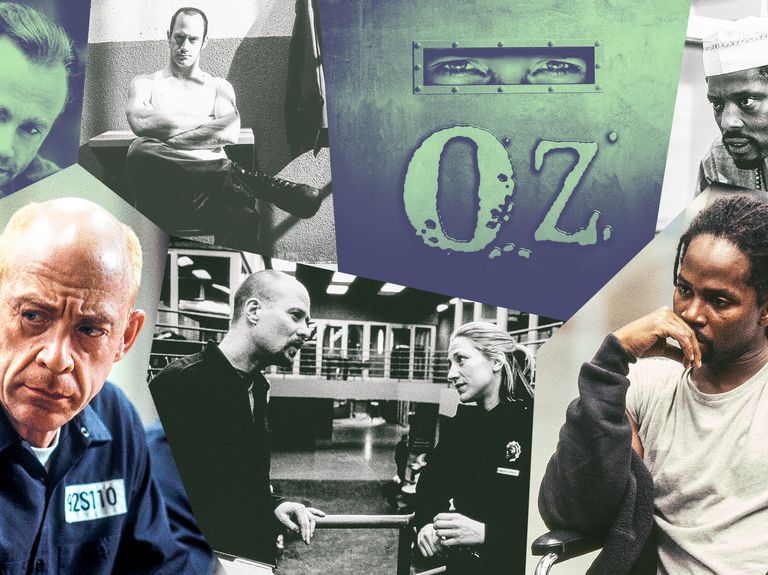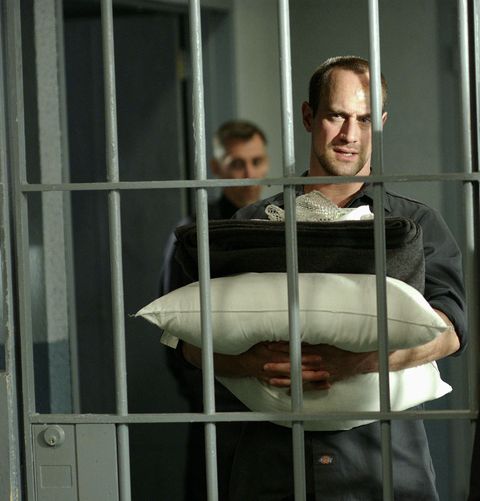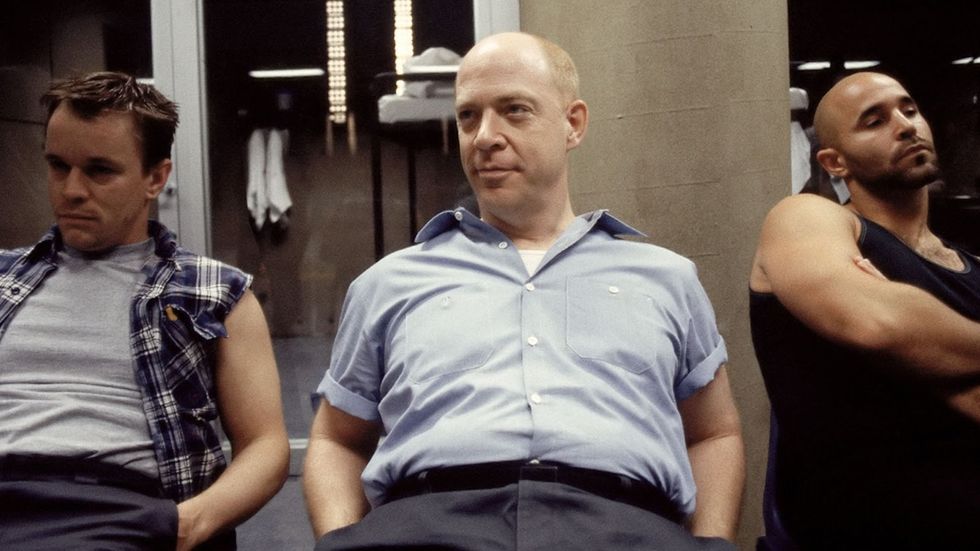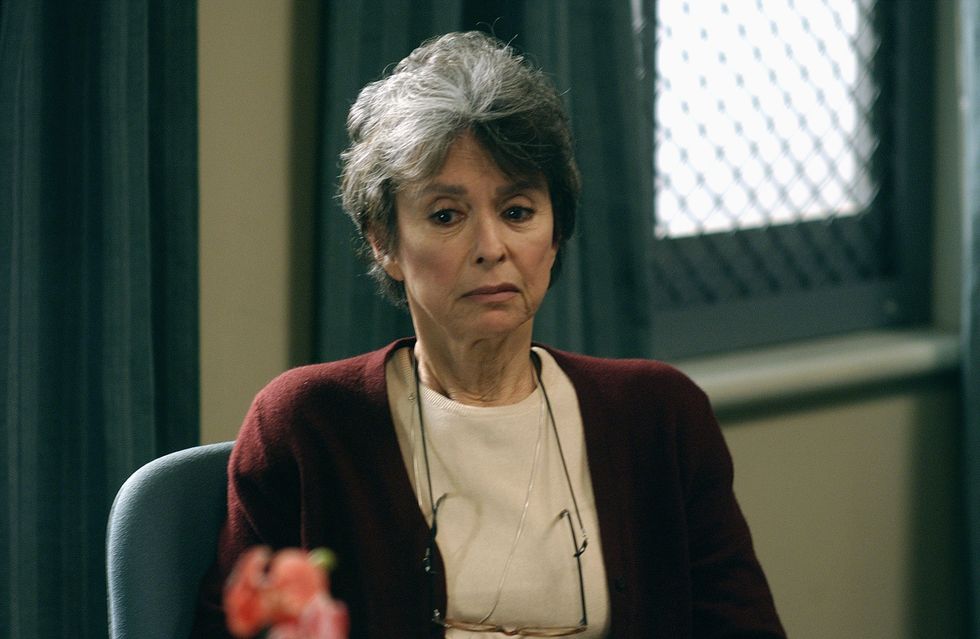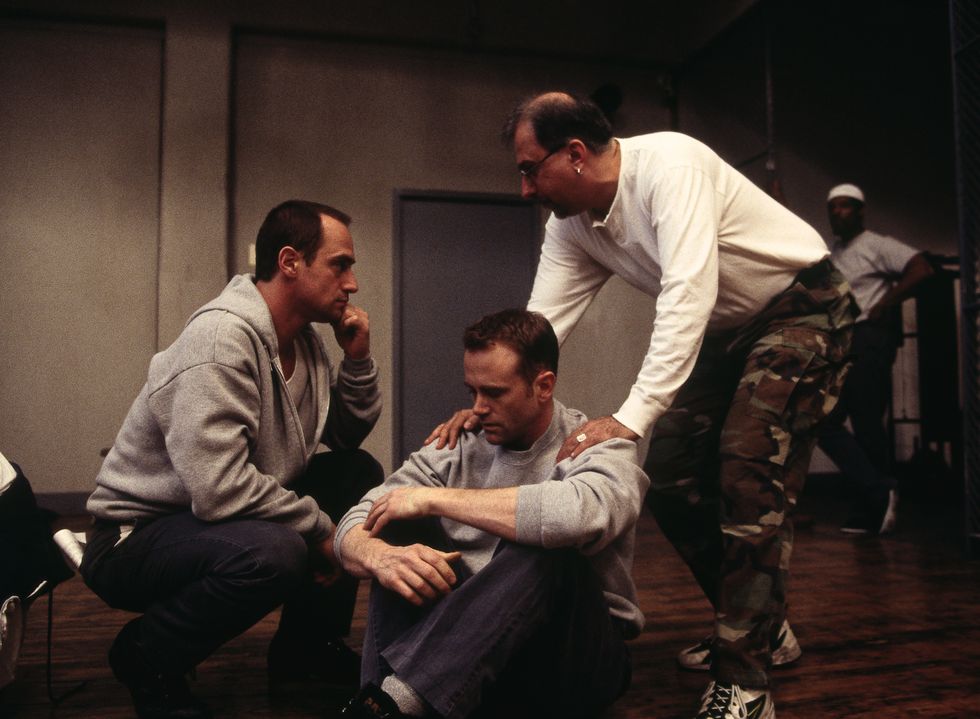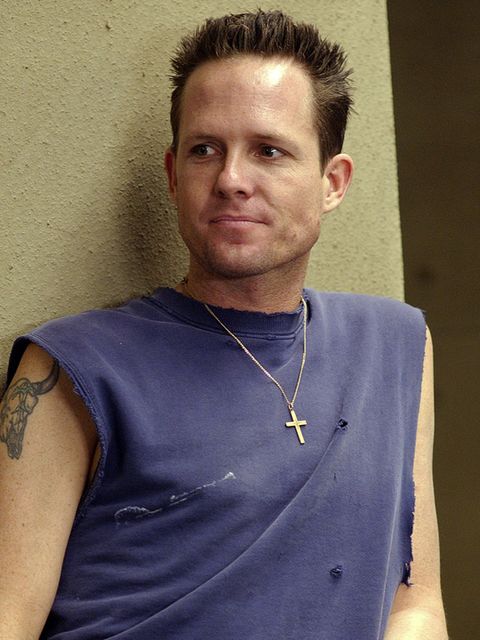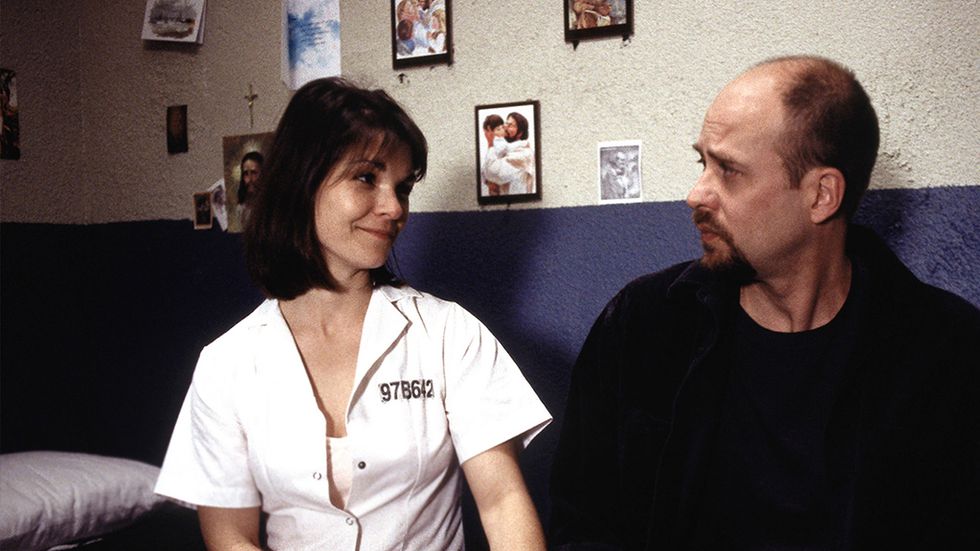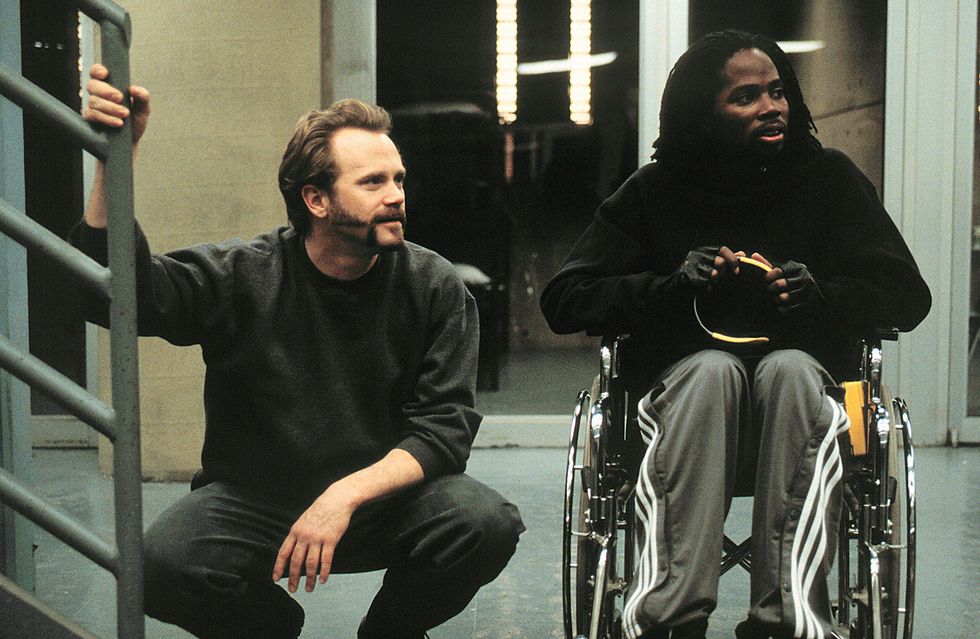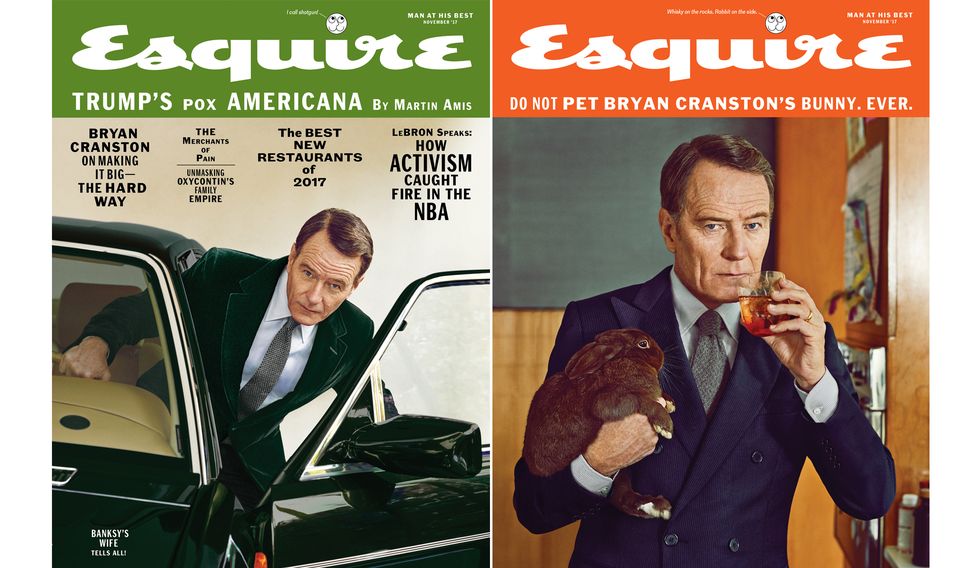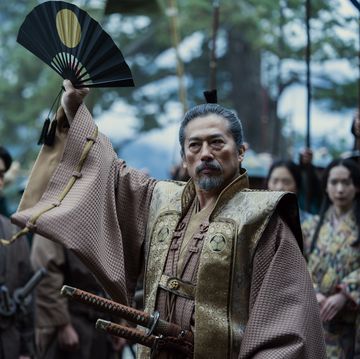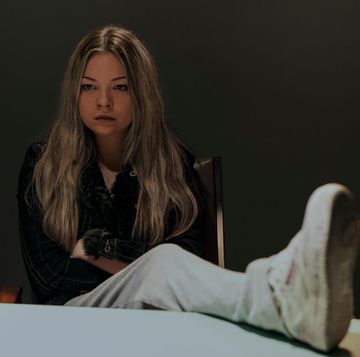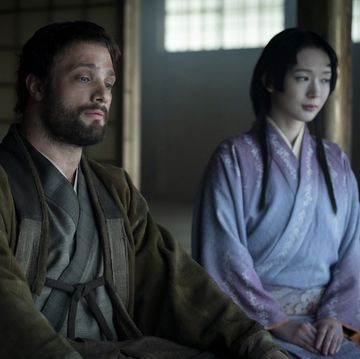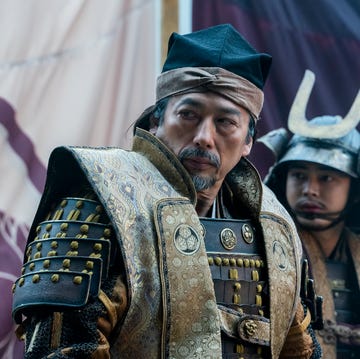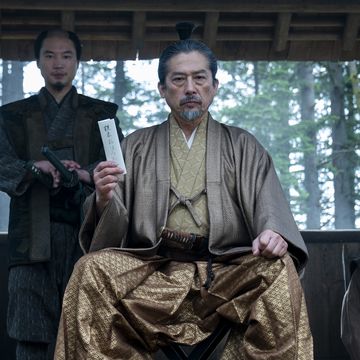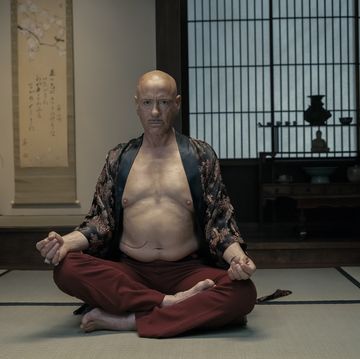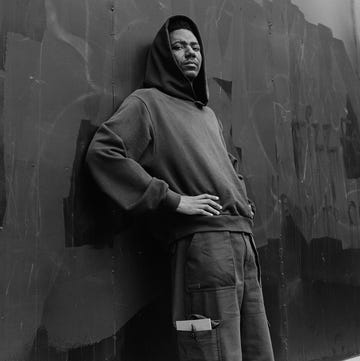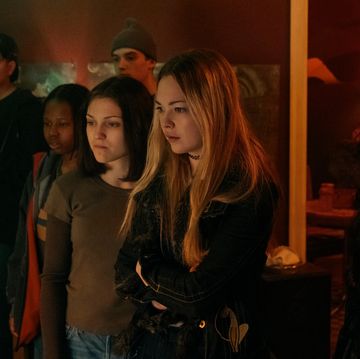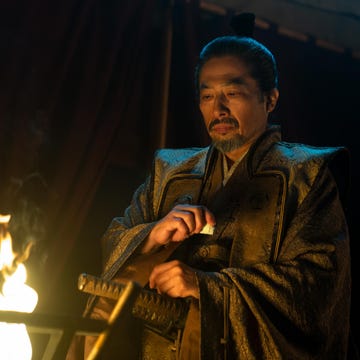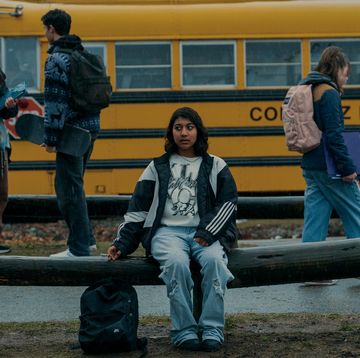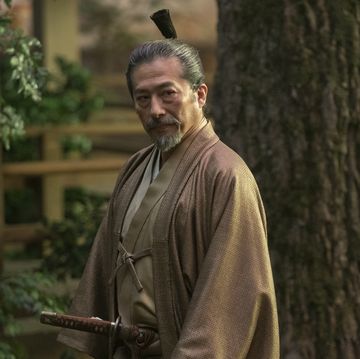A man is branded with a swastika. Another is euthanized in bed with a hand over his nose and mouth. A third is sprayed with lighter fluid and set aflame. And that’s just in the first episode. Two decades on, it’s clear that the 1997 premiere of Oz was the Big Bang of Great TV. An HBO ensemble drama set inside the Oswald correctional facility, redefined what you could do on non-network television—pretty much anything, it turned out—while fearlessly probing the unexplored tensions in American life. Without it, there would be no Sopranos, no Breaking Bad, no Walking Dead, no Game of Thrones.
Several key cast members join creator Tom Fontana to reflect on the show’s enduring impact.
Tom Fontana: We were really in uncharted territory, because HBO had never done a drama series before.
Dean Winters (Ryan O'Reily): Who watches HBO in 1997 at 11:00pm? Nobody. Tom [Fontana] was approaching issues without kid gloves on 20 years ago, and that’s why I think Oz didn’t really find its footing initially.
Don’t get me wrong, there were amazing writers on television before Tom and after Tom—I won’t lie about that. But if you talk to any writer worth his grain of salt, whether it’s Vince Gilligan or David Simon, any of these guys, they’ll say it all started with Tom. America is playing catch up.
Lee Tergesen (Tobias Beecher): When Method Man first met Tom, he was like “You’re the one who writes this stuff? A forty-year-old Italian guy from Buffalo?” Tom is my best friend in the world.
J.K. Simmons (Vern Schillinger): Tom Fontana is equal parts genius and mentor and pater familia—and you know, just a great guy.
Christopher Meloni (Chris Keller): It was brutality combined with poetry. Harold Perrineau was the Greek chorus, the grand observer of these silly games that humankind plays. I thought that was a cool way to present a show that also had inmate rape and all that other brutal stuff. There was nothing like it on TV.
Kathryn Erbe (Shirley Bellinger): I didn’t appreciate the show as much when I was on it as I do now.
Rita Moreno (Sister Peter Marie Reimondo): Near the end of the first season I went to Tom, with whom I’ve become very close by the way, we are now dear friends—I said to him, "You wouldn’t happen to be Catholic, would you?" And he said, "Yeah! How’d you know?" I said, "Only a Catholic could have written this show." The redemption, the violence—there’s something so Catholic about all that to me. Apparently, some priests agreed with that.
Tergesen: There was one critic who said, “This show offends me, and it offends God.” I love that a TV critic has the ear of God.
Fontana: I thought to myself, "Unless I have actors who are relatively unknown, the audience is going to go ‘Oh there’s that guy.’” That wasn’t true obviously of Rita Moreno or Ernie Hudson, because they had come to with us with very established careers, but for the most part I wanted the faces to be fresh. I wanted the audience to only know them as the character on Oz.
J.K. Simmons: There was this quest for credibility for a lot of us playing these tough guys and we were kind of feeling our way—for all of us except Chuck Zito of course, who is an actual tough guy. The rest of us were just a bunch of musical theater sissies.
I would always tell people that what makes Oz so great is that it’s shot in New York and New York actors are the best, blah, blah, blah. Of course, I’ve been living in L.A. for the past 14 years, so I’m not quite sure what that says.
Winters: You had an environment where any given day you have 68 guys and you need to blow off some steam and we all realized early on that the wrong way to blow off that steam would be to avoid each other; it was more about embracing each other because the content of the show was so hard, what we were putting on camera that the only way to levitate that was to have a lot of fun. I’m telling you, I’ve never had that much fun on a set. Besides Edie Falco, Betty Buckley, Rita Moreno, and Lauren Velez, it was like a pirate ship.
Tergesen: It was so predominately male—except for the sexiest woman on the planet, Rita Moreno—it was like a frat house, except I hate frats.
Harold Perrineau (Augustus Hill): We didn’t have big trailers or assistants or any of that kind of stuff on set with us. We had these makeshift rooms where we could go and sit if we had to get ready for the next scene but they weren’t anything glamorous. If we had lunch, everybody would eat in a common area.
When there was nothing to do, you’d see guys in the corner playing cards or doing pushups, or we’d be making plans about something we were doing later, or supporting somebody’s new rap group. It felt like a real brotherhood. It’s actually the closest I’ve ever felt on any set I’ve ever been on. Kirk Acevedo was the best man at my wedding.
Fontana: You’d literally have J.K. Simmons and Lee Tergesen choking each other in a scene, and the director would yell “Cut!” and they would drop their hands and say, “Wanna go bowling?” This bunch of actors hung out together, they went to nightclubs together, they had dinners together. They were remarkably tight, I guess because what they were expected to do on the show was so sort of brutal and extreme, that they wanted to be able to feel like they were protected by their fellow actors and felt an ability to communicate with their fellow actors when the cameras weren’t rolling.
Simmons: I took Eamonn Walker to see his first American baseball game at Yankee Stadium, which really freaked people out, because the first season had aired by then, and people were seeing the head of the Aryan brotherhood and a black Muslim together at a Yankees game. We turned a lot of heads.
Tergesen: You know it was funny because J.K. won the Oscar for Whiplash, I texted him, “Oh my god, I just realized I licked the boots of an Oscar winner.” And he goes, “If memory serves, you also shat in the face of an Oscar winner.”
Moreno: At the point that I was invited to play Sister Pete I was still doing all of the Latino bullshit. Not out of choice necessarily, but because that’s what there was. Tom asked to have dinner with me and my husband. I said to him, "So tell me, what is this show about?" He said a maximum-security prison. I said, "Well who would you want me to play in it?" "I’d like you to be the nun." I nearly choked on my cake! "You want me to play a nun?" I’d played all kinds of floozies—but a nun? Then I said, "With my luck, this show will be a success and I’ll be stuck wearing a wimple for the rest of my career." And he said, "Oh, no, no, this is not that kind of nun at all." On the spur of the moment, I asked, "Could she have a bottle of whiskey in one of her file drawers for when things get really rough?" And he said, "Of course." So I said, "Okay, I’m in."
It was a seminal experience—I loved every minute. And it got me a new kind of respect in the business. A lot of people thought, "Well, she’s serious about what she does." In other ways, it deprived me of a lot of employment because all the people who were in a position to cast me said, "She looks like hell."
Tergesen: There was all this stuff back then about Will Smith and Six Degrees of Separation. In the play there was a kiss and he didn’t wanna do the kiss in the movie version because Denzel Washington said, “Don’t ever kiss a man on film because it will ruin you.” I said to Chris, “I don’t know exactly where this is going, but I know this is going to be a big deal for these two characters and instead of shying away from it, I think we should try and make it sexy.” And he went “Wowwww.”
And a lot of gay people I’ve known over the years, different people who were gay, have told me, that relationship—as fucked up as it was—made them feel it was okay to be gay.
Meloni: It was not only a deep honor but an eye-opening experience. I got all of this feedback gay men who basically were saying, "Thank god. Finally, a three-dimensional gay character"—albeit a psychopathic one, but that aside. "We don’t want the guy sashaying with the lisp. We just want a man who happens to be wired in a certain way."
Tergesen: We shot 12 hours a day, which is not a lot, but we got maybe two takes, so your focus has to be incredible. It was down and dirty, our dressing rooms were like plywood partitions on the sixth floor of the Chelsea market building where we shot it. And it was bare bones
Winters: I really learned to be a Swiss clock on Oz. Tom Fontana and Jim Finnerty, who produced it, expected you to show up, know your lines, keep your mark. If you’re gonna question something, you don’t do it on the day of; you do it when you get the scripts. I also leaned that actors are secondary—it’s all about the writing.
Simmons: You show up at 7 AM, you leave at 7 PM, you do your job, there’s no drama except the drama that’s on the page. That’s the vibe that I try to bring and try to help create on every set that I work on.
I would get home from shooting with a swastika tattooed on my chest and my wife would go off to her job in Disney’s Beauty and the Beast on Broadway, a slightly different vibe.
Erbe: If you were a problem, if you made it difficult for other people, then your character would die.
Fontana: Chris Albrecht gave me a complete free hand. When someone says, “You can show anything you want to show,” there’s a giddiness—“Ooh, I can throw mud all over the place!” But what I quickly learned was that I had a responsibility to tell the story and to use the violence and the sex and the language when it was necessary for the character, as opposed to me just going, “This will be fun.” The cast was pretty game to try anything if it felt right for the character.
Moreno: One time I was so upset about something that Tom wrote—a character receives his son’s hand in the mail—that the next day I came into work and I rolled up a newspaper and I spotted him and I started to beat him up with it. "How could you do this?!" And I really went crazy—I was so upset. He just kept saying, "What did I do? What did I do?" I said, "You know what you did!"
Winters: I’m a very nonviolent person so there were scenes, like in the riot scenes in the first season and some of the fight scenes, when I got scared. And thank God we had a really informed stunt unit. Because sometimes you forget that you’re acting, and there were definitely moments where it got a little out of hand. There was scene in the kitchen where my brother and I are serving food to the prisoners and Schillinger winks at my brother, basically alluding to the fact that he had raped him, and I remember losing it. I jumped over the counter, which was not scripted, and they had to restrain me. That’s me being a bad actor.
Perrineau: We were showing not just the violence but the aftermath of the violence, which is something that you don’t often see. A guy stabs somebody, one guy dies, but then another guy lives with it. It changes him and makes him different in some way or another. I thought that was really groundbreaking, not just violence for violence’s sake but to let you know the cost of that kind of violence.
Meloni: How many times have you opened a newspaper and gone, “I can’t imagine how cruel one person can be to another.” On Oz, we don’t even scratch the surface.
Tergesen: J.K. said to me, “I get it when people see me on the street and say, ‘Hey you dirty Nazi bastard.’ The creepy thing is when somebody’s like, ‘You’re speaking my language.’”
Simmons: I would get guys coming up to me occasionally with a certain look in their eye, and I would nod and smile and try and get out of the situation as quickly as possible.
Fontana: I got a call from HBO saying that some Aryan group had threatened not only me, but Barry Levinson, my business partner, and Jerry Levin, who at the time was the CEO of Time Warner. HBO wanted to get us bodyguards, but I said no, and not out of some bizarre bravery. I just thought if I start being afraid, I’m never going to write anything again. So I didn’t take the bodyguards. And I’m still alive.
Moreno: I said to Tom, "You know, I’ve always wondered what it would be like to get into the sensual life of a religious person. You know, in one of her sessions with one of the prisoners, maybe someone my age, she could start getting a crush?" And he loved that idea, but Tom being Tom—and a writer, and perverse—had me fall madly in love with a sexual predator way younger than I.
Erbe: It was a very new experience for me playing someone like Shirley. I did things for that character and for Tom that I never have done in other situations. I just tried to suit up and do the job, and divorce my own judgment and my own emotions from her.
When Shirley was hanged, I did the scene with my then husband asking him how I should die. That day after work, when I’m home after dinner washing dishes, I thought, “Wow, I was dying today and now I’m home washing dishes. This is a really weird life.”
I was kind of shocked by how freely the sick, twisted impulses would come into my head. Each week I would read the new script with trepidation, wondering, “Oh my god, what am I going to have to do this time?”
Simmons: I get home one day and there’s a message on my answering machine: “Hey J.K., its Tom. Had a question about something I’m thinking about writing for your character and I just want to talk about it before we go ahead with it.” I’m thinking to myself, This guy has had me beat the crap out of people, raping them, he’s had me crucify a guy—what in the hell is he thinking about having me do that suddenly now he feels the need to get my approval for? What twisted act of mayhem is in store?? I call him back and he says, “Would you be willing to sing?”
Winters: Oz was such a gift. But it’s tough because it’s like flying private for your first flight and then having to fly commercial for the rest of your life. Nothing has even remotely come close to it.
Tergesen: The show gave you a chance to look at people that you initially didn’t think you had anything in common with. But once you understand their story, you start to see the similarities and that’s what was great about it and I think what needs to be happening more now.
I was in a church up in Harlem and there was an eight- or nine-year-old boy next to me, and he’s like, “Are you Beecher?” I say, “Yeah.” He goes, “I told my mom that it was you but she didn’t believe me.” I turn to the mother and say, “Isn’t he too young to watch this show?” And she said, “No. He has got to know that there is a horror show out there. That it’s not cool to go to jail.”
Perrineau: One of the questions that I was always asked is: Are prisons for retribution or rehabilitation? And I don’t think we’ve answered it yet.
Erbe: Tom saw prison as a microcosm of the country.
Fontana: If you have a clear enough vision about what you want to say and the world you want to depict, there is an audience willing to experience it with you. I think a lot of times in television we dumb down because we think the audience is too stupid to understand. And what I think I learned from Oz was that, at least the HBO subscribers, were more than willing to look at the world from a different point of view.
Also, I always thought Oz was the funniest show on TV.
A version of this article appears in the November '17 issue of Esquire.
